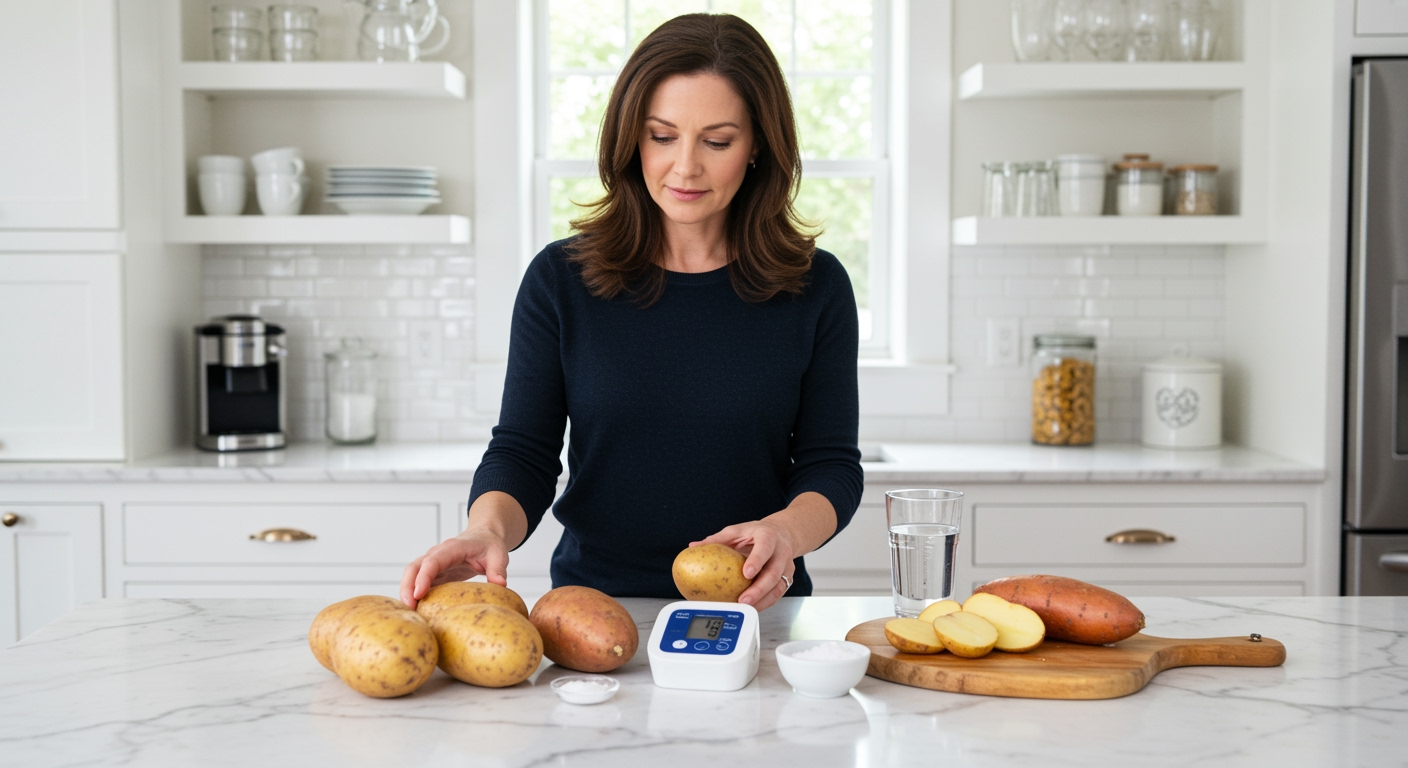✪ Key Takeaway: Potatoes can help raise low blood pressure through their high potassium content and natural sodium balance.
Introduction
You grab a potato from your kitchen counter and wonder if this simple vegetable could actually help your low blood pressure.
Many people with low blood pressure struggle to find natural ways to support their cardiovascular health without relying solely on medications or extreme dietary changes.
Hi, I’m Abdur, your nutrition coach and today I’m going to explain exactly how potatoes can become a valuable ally in managing low blood pressure naturally.
What Makes Potatoes Special for Blood Pressure?
Potatoes contain an impressive amount of potassium, with one medium baked potato providing about 610 milligrams of this essential mineral.
This potassium content works directly with your body’s sodium-potassium pump, a cellular mechanism that helps regulate fluid balance and blood vessel function.
When you have low blood pressure, your blood vessels may be too relaxed, and the natural electrolyte balance from potatoes can help support proper vascular tone.
The complex carbohydrates in potatoes also provide steady energy that supports your cardiovascular system without causing dramatic blood sugar spikes.
Research shows that adequate potassium intake helps maintain healthy blood pressure levels by supporting proper muscle contractions in your heart and blood vessels.
✪ Fact: One medium potato contains more potassium than a banana, making it an excellent choice for blood pressure support.
How Do Potatoes Actually Raise Blood Pressure?
The mechanism behind potatoes and blood pressure involves several physiological processes working together in your cardiovascular system.
When you eat potatoes, the potassium gets absorbed into your bloodstream and helps regulate the renin-angiotensin system, which controls blood pressure.
This system involves your kidneys releasing hormones that affect how your blood vessels constrict or dilate, directly impacting your blood pressure readings.
The natural sodium content in potatoes, while low, provides just enough to help maintain proper fluid retention when combined with adequate water intake.
Additionally, the vitamin C and antioxidants in potatoes support healthy blood vessel walls, which can improve circulation and help stabilize blood pressure.
The fiber content also plays a role by supporting healthy digestion and nutrient absorption, ensuring your body can effectively use all the beneficial compounds.
✪ Pro Tip: Eat potatoes with the skin on to maximize potassium and fiber intake for better blood pressure support.
Which Types of Potatoes Work Best?
Russet potatoes contain the highest potassium levels, making them the top choice for people dealing with low blood pressure issues.
Sweet potatoes offer additional benefits through their beta-carotene content and slightly higher natural sugar levels, which can provide gentle energy support.
Red potatoes and fingerling varieties contain concentrated nutrients in their colorful skins, providing extra antioxidants that support cardiovascular health.
Purple potatoes contain anthocyanins, powerful antioxidants that may help improve blood vessel function and overall circulation.
The key is choosing whole, unprocessed potatoes rather than processed potato products that often contain added sodium and preservatives.
Preparation method matters too, with baked, boiled, or steamed potatoes retaining more nutrients than fried versions.
✪ Note: Avoid adding excessive salt to potatoes as this can counteract their natural blood pressure benefits.
How Much and When Should You Eat Potatoes?
For low blood pressure support, aim for one medium potato daily as part of a balanced meal plan that includes other nutrient-dense foods.
Timing matters, and eating potatoes during your main meals rather than as snacks helps provide sustained energy and cardiovascular support throughout the day.
Combining potatoes with lean proteins and healthy fats helps slow digestion and provides more stable blood sugar levels, which supports overall circulation.
If you experience postural hypotension (dizziness when standing), eating a small portion of potato before meals may help stabilize your blood pressure.
Monitor your body’s response and adjust portion sizes based on how you feel, as individual needs can vary significantly.
Remember that potatoes work best as part of an overall heart-healthy diet that includes adequate hydration and regular physical activity.
✪ Pro Tip: Keep a food diary to track how different potato preparations affect your blood pressure readings.
Are There Any Risks or Considerations?
While potatoes are generally safe for most people, those with diabetes should monitor their blood sugar response since potatoes have a moderate glycemic index.
People taking certain blood pressure medications should consult their healthcare provider before significantly increasing potato intake, as it may affect medication effectiveness.
Green potatoes contain solanine, a natural toxin that can cause digestive issues, so always choose potatoes without green coloring or sprouting.
If you have kidney problems, the high potassium content in potatoes might not be appropriate, and you should discuss this with your doctor first.
Weight management is important for blood pressure health, so consider the caloric content of potatoes within your overall daily intake.
Some people may experience digestive discomfort when suddenly increasing their potato intake, so start with smaller portions and gradually increase.
✪ Note: Always work with your healthcare team when making dietary changes to manage blood pressure conditions.
The Bottom Line
Potatoes can indeed be a valuable addition to your diet if you’re dealing with low blood pressure, thanks to their impressive potassium content and natural electrolyte balance.
Simple foods often provide the most powerful health benefits when we understand how to use them properly.
I’d love to hear about your experience with using potatoes for blood pressure management, so please share your questions or results in the comments below.
References
At NutritionCrown, we use quality and credible sources to ensure our content is accurate and trustworthy. Below are the sources referenced in creating this article:
- Medical News Today: Potatoes: Health benefits, nutrients, preparation, and more
- Harvard Health: Broccoli beats potatoes for lowering blood pressure
- PubMed: Potato consumption and risk of hypertension
- WebMD: Potato uses, benefits and side effects





